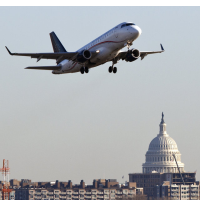Much of U.S. Government Grounded as Budget Cuts Take Toll on Air Travel
 (photo: J. Scott Applewhite, AP)
(photo: J. Scott Applewhite, AP)
It has been five months since the sequestration budget cuts kicked in, and one of the impacts is that federal workers are being forced to cancel their travel plans.
Most government travel budgets have been reduced by 30% this year, forcing managers to decide who can and cannot attend conferences and other important events.
Defense Secretary Chuck Hagel is traveling to Afghanistan only two times in 2013, instead of the usual four.
The office of the United States Trade Representative can afford to send a negotiator to only one of 41 countries—Ukraine—accused of violating American intellectual property rights.
Government scientists monitoring volcanoes in Alaska also have had to scale back their trips.
And for the first time in about 30 years, the National Aeronautics and Space Administration had to withdraw from the National Space Symposium in Colorado Springs because it could not afford the travel costs. Meanwhile, representatives from Europe and Asia attended the event.
Critics of government waste say the sequestration cuts aren’t necessarily a bad thing.
“Hopefully what you will have is more sound judgment at these agencies about what is critical travel and what isn’t,” Senator Tom Coburn (R-Oklahoma) told The New York Times. “There is no question that federal employees should have some travel and go to some conferences, but most of it has nothing to do with their jobs. It’s a perk.”
News of the travel cutbacks fall on deaf ears when critics bring up reminders like the $800,000 that the General Services Administration spent on a clown, a comic, a mind reader and airfare for 300 government workers to attend a 2010 retreat near Las Vegas.
One of the beneficiaries of air travel cutbacks is the intercity bus services, whose business has spiked for riders traveling from Washington to New York.
Many in Washington, particularly government scientists and medical professionals, have turned to webinars and video conferencing as cost-saving measures. However, their absence from conferences have cost event organizers thousands of dollars and also resulted in the withdrawal of research papers as a result of their authors not being on hand to present them.
Pentagon officials grounded by air travel cuts have not been able to use video conferencing as a substitute due to lack of online security.
-Noel Brinkerhoff
To Learn More:
U.S. Workers Are Grounded by Deep Cuts (by Michael D. Shear and Ron Nixon, New York Times)
D.C. Lawmakers Fended off Sequester Threat to Their Air Travel, but Courts Are on Their Own (by Ken Broder, AllGov California)
- Top Stories
- Unusual News
- Where is the Money Going?
- Controversies
- U.S. and the World
- Appointments and Resignations
- Latest News
- Trump Orders ICE and Border Patrol to Kill More Protestors
- Trump Renames National Football League National Trump League
- Trump to Stop Deportations If…
- Trump Denounces World Series
- What If China Invaded the United States?






Comments